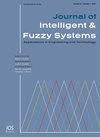Mutation transit search algorithm introducing black hole swallowing strategy to solve p-hub location allocation problem
IF 1
4区 计算机科学
Q3 COMPUTER SCIENCE, ARTIFICIAL INTELLIGENCE
引用次数: 0
Abstract
The p-Hub allocation problem is a classic problem in location assignment, which aims to optimize the network by placing Hub devices and allocating each demand node to the corresponding Hub. A mutation Transit search (TS) algorithm with the introduction of the black hole swallowing strategy was proposed to solve the p-Hub allocation problem. Firstly, the mathematical model for the p-Hub allocation problem is established. Six mutation operators specifically designed for p-Hub allocation problem are introduced to enhance the algorithm’s ability to escape local optima. Additionally, the black hole swallowing strategy was incorporated into TS algorithm so as to accelerate its convergence rate while ensuring sufficient search in the solution space. The improved TS algorithm was applied to optimize three p-Hub location allocation problems, and the simulation results are compared with those of the basic TS algorithm. Furthermore, the improved TS algorithm is compared with the Honey Badger Algorithm (HBA), Sparrow Search Algorithm (SSA), Harmony Search Algorithm (HS), and Particle Swarm Optimization (PSO) to solve three of p-Hub allocation problems. Finally, the impact of the number of Hubs on the cost of three models was studied, and the simulation results validate the effectiveness of the improved TS algorithm.引入黑洞吞噬策略的突变过境搜索算法解决p-hub位置分配问题
p-Hub分配问题是一个经典的位置分配问题,其目的是通过放置Hub设备并将每个需求节点分配到相应的Hub来优化网络。提出了一种引入黑洞吞噬策略的突变过境搜索(TS)算法来解决p-Hub分配问题。首先,建立了p-Hub分配问题的数学模型。引入了针对p-Hub分配问题设计的6个突变算子,增强了算法逃避局部最优的能力。此外,在TS算法中加入了黑洞吞噬策略,在保证在解空间中充分搜索的同时,加快了TS算法的收敛速度。应用改进的TS算法对3个p-Hub位置分配问题进行了优化,并与基本TS算法的仿真结果进行了比较。将改进后的TS算法与Honey Badger algorithm (HBA)、Sparrow Search algorithm (SSA)、Harmony Search algorithm (HS)和Particle Swarm Optimization (PSO)进行了比较,解决了3个p-Hub分配问题。最后,研究了集线器数量对三种模型成本的影响,仿真结果验证了改进TS算法的有效性。
本文章由计算机程序翻译,如有差异,请以英文原文为准。
求助全文
约1分钟内获得全文
求助全文
来源期刊

Journal of Intelligent & Fuzzy Systems
工程技术-计算机:人工智能
CiteScore
3.40
自引率
10.00%
发文量
965
审稿时长
5.1 months
期刊介绍:
The purpose of the Journal of Intelligent & Fuzzy Systems: Applications in Engineering and Technology is to foster advancements of knowledge and help disseminate results concerning recent applications and case studies in the areas of fuzzy logic, intelligent systems, and web-based applications among working professionals and professionals in education and research, covering a broad cross-section of technical disciplines.
 求助内容:
求助内容: 应助结果提醒方式:
应助结果提醒方式:


